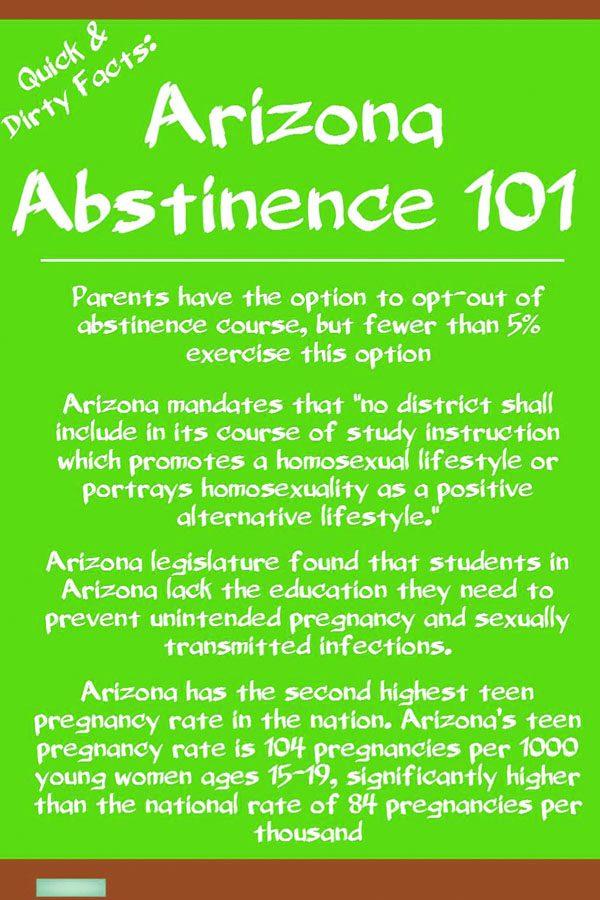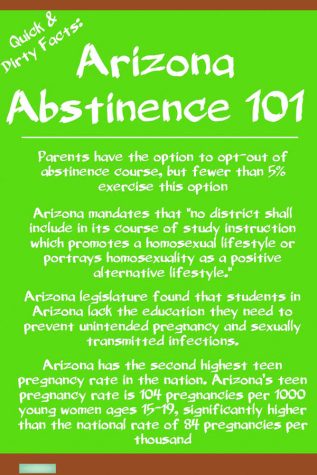Finding a solution to sexual education
Sources for the infographic are provided by : “School-Based Sexuality Education: The Issues and Challenges” from guttmacher.org, “‘No Promo Homo’ Laws” from glsen.org, Arizona SB1020 sexual education reform bill, and “Arizona’s Youth: Focus on Sexual and Reproductive Health” from advocatesforyouth.or, respectively.
Time to face the facts: teenagers have sex. Not just at Perry High School, or even just within the Chandler Unified School District; but throughout Arizona and even the country. Many states including Arizona have implemented an “abstinence until marriage” program, promoting the fear aspect of sex to deter students from partaking in the action. Sexually transmitted diseases (STDs), unhappy teen pregnancies, and even the comparing of girls to tape or dirty shoes after breaking virginity are just some of the techniques being used to intimidate high schoolers into remaining abstinent.
Statistics reveal that the stress of abstinence-only sex education in states including Arizona still leaves a relatively high percent of high schoolers having sex. A study cited by advocatesforyouth.org reveals that “Of high school students, 43 percent in Arizona reported ever having sex, and 47 percent nationwide.”
Here’s where the problem occurs: those 43 percent of Arizona high school students having sex have not been thoroughly educated on the very action they are partaking in; because of this, they lack the tools necessary to keep themselves safe.
An amount of students will always have sex, regardless of how many times or how many ways they are told not to. Instead of trying to shut the action down entirely, they should be educated on what to do and how to stay safe. Time and time again research has found abstinence-only programs to be ineffective, and even detrimental in the long run.
A July 2007 “meta-study” published in the British Medical Journal and cited by the Sexuality Information and Education Council of the United States reviewed data examining the results of 13 abstinence-only trials including almost 16,000 students: “Abstinence-only-until-marriage programs were ineffective in changing any of the behaviors that were examined including the rate of vaginal sex, number of sexual partners, and condom use. The rates of pregnancy and STDs among participants in abstinence-only-until-marriage programs were unaffected.”
Despite the information being released in 2007, the message is clear: If schools are going to teach sex education, it needs to be taught in a way that does not shame students, but allows them ways to keep themselves and their partner safe.
As Senator Andrew Sherwood, D-Tempe, says, “I think that to promote abstinence insinuates some form of judgement. Only a person can decide what’s best for them and when they’re ready for any particular relationship.”
Sherwood introduced the SB 1020 bill in Arizona, a bill with the goal to reform sexual education. His primary goal is to bring about sexual education earlier on in the school system.
“You wouldn’t want to start some things so late in the game, when people could potentially start becoming sexually active.”
This bill, unlike current laws, also highlights giving students medically accurate information and making the education inclusive for everyone. Currently, according to Sherwood, there is no piece in Arizona statute that requires medically accurate information to be given.
Also in Arizona, along with seven other states, stands a “No Promo-Homo” law, which prohibits sexual education in the classroom from even “[suggesting] that some methods of sex are safe methods of homosexual sex.” This law not only discriminates against homosexual students, but also shows the narrow-mindedness of the sexual education program as a whole: teaching selective information in an attempt to force students into a specific mindset.
The promotion of medically accurate information, without the shaming of the choices and lifestyles of students is the only way to ensure the safety of high schoolers when it comes to sexual education. Teenagers need to feel included and informed in order to take steps towards their future in any scenario, including sex.



